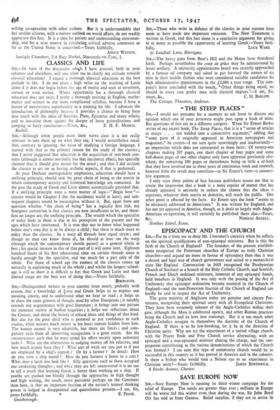SIR,—Although when people make their views clear it is not
really relevant to take them up on what they say, I would nevertheless recall that, contrary to ignoring the value of studying a foreign language, I started with that as the primary reason for the study of the classics ; that I never suggested that education is the acquisition of text-book con- tents (although it almost inevitably has that incidental effect), but specially claimed that it should give matter for the mind ; and that I did acclaim the classics as art (or as having xsthetic aspects, if that is preferred).
As your Durham correspondent emphasises, education should have a unifying principle, should seek the great chain of being as the matrix in which contemporary activity and historical knowledge are contained. In the past the study of Greek and Latin almost automatically provided that. If a unifying principle were a mere matter of logic—" Begin here "- classics would be Chapter I (for the occidental world at least), and sub- sequent chapters would be meaningless without it. But, apart from any question whether "the chain of being" has a logically first link, my bourgeois contention is that classics are now insufficient to be, and there- fore no longer are, the unifying principle. The wealth which the specialist of today finds in them is due to his perception of the present and the ages which have intervened. It is true that not to know what happened before one's own day is to be always a child ; but there is much more to today than the classics. In a warp all threads bear equal strain ; and though no man can know them all, he should at least see the warp (through which the contemporary shuttle passes) as a general whole at first ; his special interest in this or that part of it will come later. Eighteen hundred hours of his first educational time on certain threads alone is hardly enough for the specialist, and too much for a part only of the whole. For those of school age the essence of the classics comes up naturally in explaining much of the whole ; and whilst the longest school- age is still so short it is difficult to feel that Greek and Latin and their limited range are the best way of doing that—Yours faithfully,


































 Previous page
Previous page